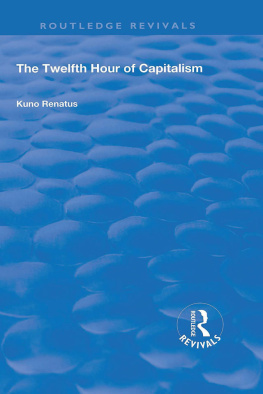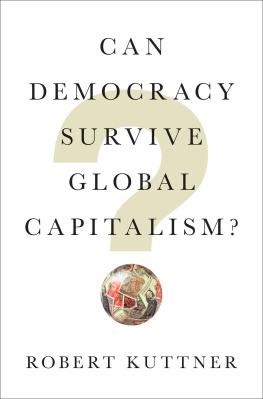Kuno Renatus - The Twelfth Hour of Capitalism
Here you can read online Kuno Renatus - The Twelfth Hour of Capitalism full text of the book (entire story) in english for free. Download pdf and epub, get meaning, cover and reviews about this ebook. year: 2019, publisher: Routledge, genre: Romance novel. Description of the work, (preface) as well as reviews are available. Best literature library LitArk.com created for fans of good reading and offers a wide selection of genres:
Romance novel
Science fiction
Adventure
Detective
Science
History
Home and family
Prose
Art
Politics
Computer
Non-fiction
Religion
Business
Children
Humor
Choose a favorite category and find really read worthwhile books. Enjoy immersion in the world of imagination, feel the emotions of the characters or learn something new for yourself, make an fascinating discovery.
- Book:The Twelfth Hour of Capitalism
- Author:
- Publisher:Routledge
- Genre:
- Year:2019
- Rating:3 / 5
- Favourites:Add to favourites
- Your mark:
- 60
- 1
- 2
- 3
- 4
- 5
The Twelfth Hour of Capitalism: summary, description and annotation
We offer to read an annotation, description, summary or preface (depends on what the author of the book "The Twelfth Hour of Capitalism" wrote himself). If you haven't found the necessary information about the book — write in the comments, we will try to find it.
The Twelfth Hour of Capitalism — read online for free the complete book (whole text) full work
Below is the text of the book, divided by pages. System saving the place of the last page read, allows you to conveniently read the book "The Twelfth Hour of Capitalism" online for free, without having to search again every time where you left off. Put a bookmark, and you can go to the page where you finished reading at any time.
Font size:
Interval:
Bookmark:
Kuno Renatus
E. W. Dickes

2 Park Square, Milton Park, Abingdon, Oxon, OX14 4RN
and by Routledge
52 Vanderbilt Avenue, New York, NY 10017, USA
The publisher has gone to great lengths to ensure the quality of this reprint but points out that some imperfections in the original copies may be apparent.
The publisher has made every effort to trace copyright holders and welcomes correspondence from those they have been unable to contact.
ISBN 13: 978-0-429-28315-4 (ebk)
TRANSLATED FROM THE GERMAN BY
E. W. DICKES

All rights reserved No part of this book may be reprinted in any form without permission in writing from the publisher First Edition
IN HIS SPEECH OF JUNE 27, 1931
- v
- ix
- x
- xi
- xii
- xiii
- xiv
THE TASK
Font size:
Interval:
Bookmark:
Similar books «The Twelfth Hour of Capitalism»
Look at similar books to The Twelfth Hour of Capitalism. We have selected literature similar in name and meaning in the hope of providing readers with more options to find new, interesting, not yet read works.
Discussion, reviews of the book The Twelfth Hour of Capitalism and just readers' own opinions. Leave your comments, write what you think about the work, its meaning or the main characters. Specify what exactly you liked and what you didn't like, and why you think so.











